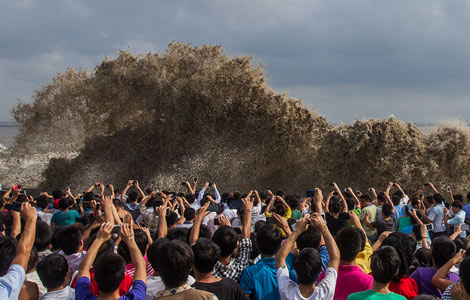Program nurtures local talent for intl positions
Updated: 2013-12-23 07:25
By Zhao Xinying (China Daily USA)
|
||||||||
Xu Shengyu has dreamed of becoming a diplomat since he was an undergraduate majoring in English.
Now, as a graduate student in an international training program at Beijing Foreign Studies University's, who is also pursuing a master's degree in international relations through a renowned UK university, the 24-year-old said his dream has come closer.
Xu is not alone. All 25 of his classmates in the program are enrolled with prestigious universities around the world to further their studies for one or two years, with the China Scholarship Council paying for their tuition and living expenses.
Established in 2010, the program was recognized by the Ministry of Education as a pilot education reform program, aiming to nurture skilled people able to work for international organizations such as the United Nations.
"On the one hand, skilled people with both excellent language abilities and professional knowledge of international organizations are extremely scarce in China. On the other, young people, especially college students, have the will and passion to participate in public affairs and to communicate with people around the world. That's why we decided to build such a platform for them," said Gao Yi, director of the program.
"The program aims to train graduates who master at least two working languages of the UN, mainly English and French, to master international relations, law and business," said Gao, who is also a deputy director of the Graduate School of BFSU.
Recruiting students since 2011, the program selected candidates from juniors in majors including English, French, international politics, international law and business, from 50 prestigious universities nationwide.
Candidates needed to show excellence in the Test for English Majors 4, or TFS 4, a test for French majors; score at least 7 in the International English Language Test System; or score higher than 100 in the Test of English as a Foreign Language.
"In addition, students' abilities to learn, think, analyze and express are also crucial criteria for us in selecting candidates," Gao said.
Since 2011, there have been about 500 applicants each year who meet the requirements, but only about 30 are accepted.
Xu was among the first batch of 26 students, who were chosen after three written examinations, one interview and three rounds of speech contests.
The program's training period lasts for three or four years, with the students spending their first year at BFSU before going abroad to earn their master's degrees at foreign universities for one or two years.
Finally, they return to BFSU for the last year of the program, working as interns for international organizations as they prepare a graduation thesis for a master's degree from BFSU.
The first year's curriculum includes foreign languages (English and French), compulsory courses such as international politics, and selective courses such as document writing, debate and negotiating skills.
Yang Yi, an associate professor who teaches China's Contemporary Diplomacy in the program, said the teachers not only give lectures to provide academic knowledge but also pay much attention to students' working skills.
"In my class, I often gave practical problems as examples to guide these students to consider what should be done to solve problems at work.
"The students, although most of them used to be undergraduates of foreign language majors and knew almost nothing about international politics, were quite brilliant and had the ability to understand what they have to learn," Yang said.
"They mastered the professional knowledge fast and made quick progress in the program," he said, adding that the students often had good ideas when writing proposals.
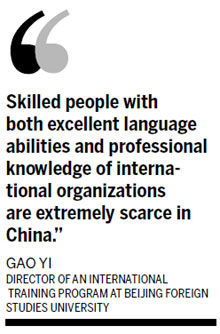
Dai Liqun, a student admitted to the program in 2013, said her first year at BFSU was quite different from her relaxed undergraduate life.
"Students enrolled in the program are good at foreign languages, so our primary mission is to build up a frame for the professional knowledge needed in our future daily work with international organizations," she said.
"We have to spend every day reading books, thinking about questions, writing papers and preparing for in-class discussions and presentations. And it's also a kind of preparation for our next year's studying abroad," said Dai, who was just admitted to the Paris Institute of Political Studies.
Students also have to make time to participate in speech contests and Model United Nations, to volunteer at international events and to undertake internships with international organizations.
But it was worth all the time and hard work involved, said Xu, who interned with the Food and Agriculture Organization of the United Nations, because students get the opportunity to put what they learn into practice while gaining a sense of achievement.
Xu, who has finished half of his UK study period, said he plans to apply for a job with China's Ministry of Foreign Affairs in the future, to get one step closer to his dream.
Gao, the director, said she supported her students' choices, while considering how to further develop the program.
"As a newly established program, we have very limited resources," she said. "So we are trying to cooperate with more foreign universities and international organizations in order to provide better study and internship opportunities for our students."
(China Daily USA 12/23/2013 page6)

 Ice storm hits Toronto
Ice storm hits Toronto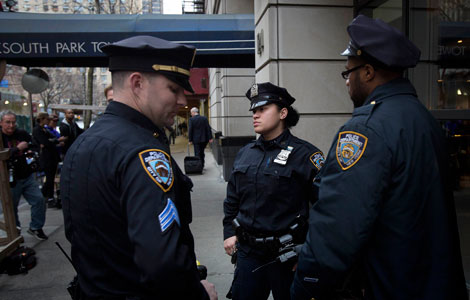
 A man and a child jump off Manhattan building
A man and a child jump off Manhattan building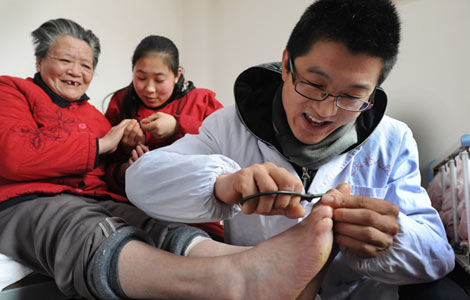
 Male nurses in demand as caregivers for elderly
Male nurses in demand as caregivers for elderly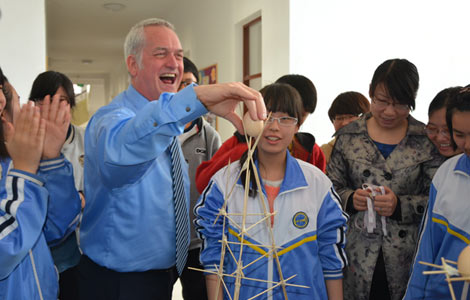
 Moving beyond language skills
Moving beyond language skills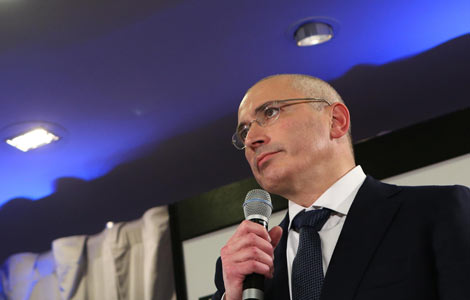
 Khodorkovsky says he will not enter Russian politics
Khodorkovsky says he will not enter Russian politics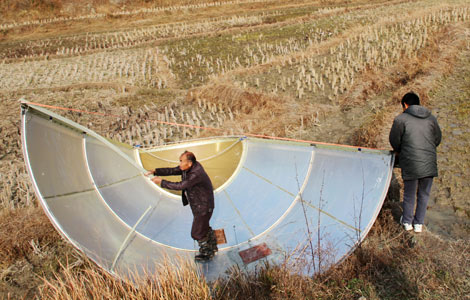
 Debris of Bolivian satellite falls on E China
Debris of Bolivian satellite falls on E China
 Migrating cranes at Israel's Hula Lake
Migrating cranes at Israel's Hula Lake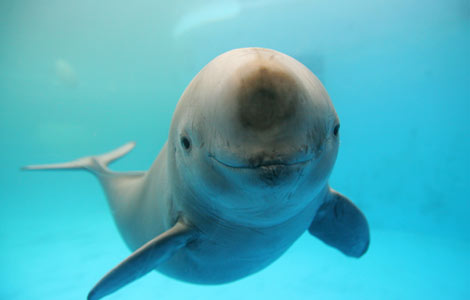
 Reviving the 'river pig'
Reviving the 'river pig'
Most Viewed
Editor's Picks

|

|

|

|

|

|
Today's Top News
Apple inks iPhone deal with China Mobile
Committee of 100 seeks to tackle 'sensitive' images about China
China's IPR courts 'would be helpful'
GM corn rejection no to hurt market
Liaoning's combat capability tested
Sotheby's denies $8m work is fake
Castro urges US to respect differences with Cuba
Student wounded in school shooting dies
US Weekly

|

|


